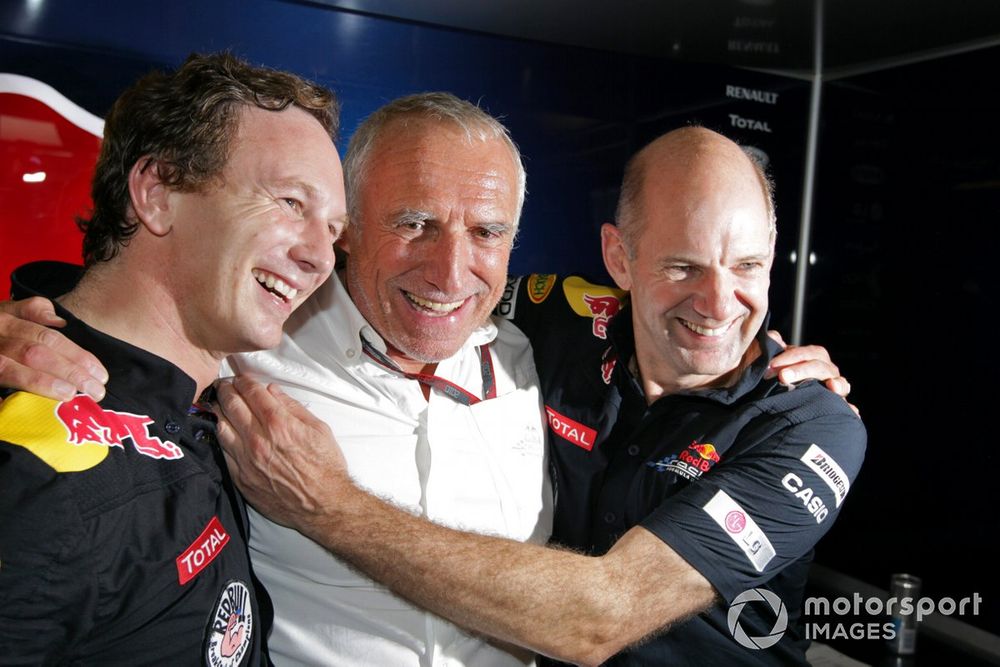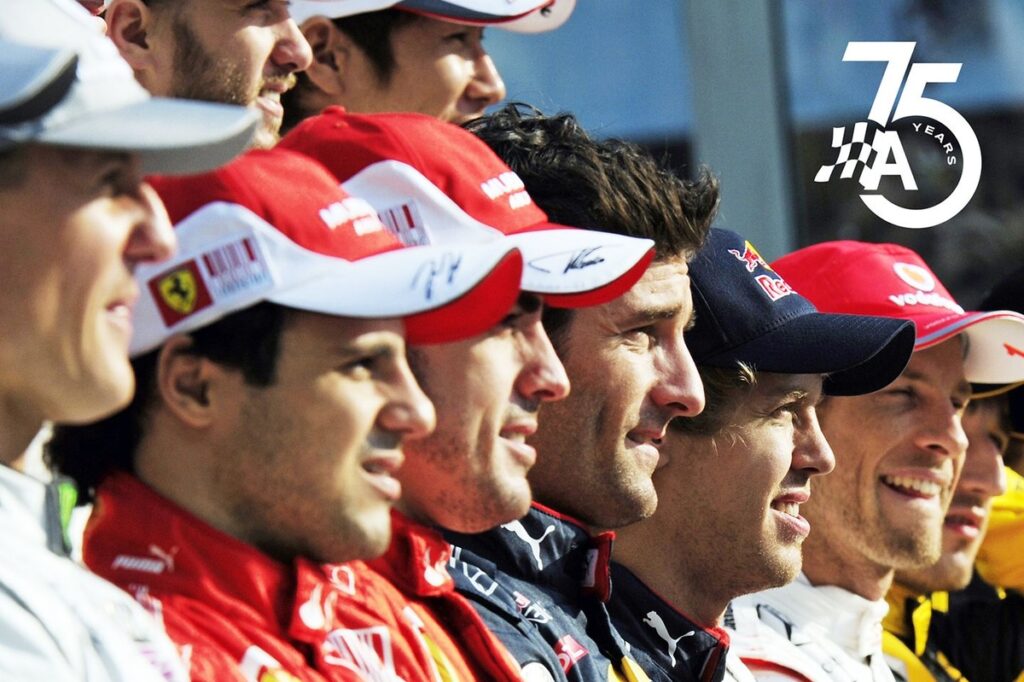Sixty-eight thousandths of a second after one lap of the 3.6-mile Suzuka circuit. That was all that separated Sebastian Vettel and Mark Webber in qualifying for last week’s Japanese Grand Prix… and it was effectively the margin by which the German won the race.
In the final reckoning, 0.068s may even decide the championship. The battle between the two has been one of the most fascinating clashes in F1 history. This is not about a hungry rising star with everything to prove taking on a multi-titled old hand – like Ayrton Senna versus Alain Prost or Lewis Hamilton versus Fernando Alonso – this is a fight of unprecedented ferocity between two world championship virgins.
Michael Schumacher once said: “In F1 there can be no real relationships or friendships, except maybe between a frontrunner and a backmarker.”
There lies an eternal truth; only in extraordinary circumstances can team-mates achieve a rapport that transcends the professional. But in the case of Webber and Vettel, there is more to it than mere rivalry. From the start, it was inevitable that the pair would clash, creating the condition for the most intriguing sub-plot of this classic GP season.
In 2009, the rivalry didn’t flare, as the Australian, still silently struggling with the after-effects of his leg-breaking mountain-bike shunt, was often shaded by Vettel.
This year, things are different. Little has separated them on pace and they are just 14 points apart in the championship. The destiny of the most closely fought drivers’ title in F1 history could be decided by the dynamic between the duo, which will be central to everything that happens in Korea, Brazil and Abu Dhabi.
It’s a fascinating GP rivalry every bit as gripping as any of those that have come before, a rivalry that could yet make or break the title dream of both men – not to mention Red Bull.
The Vettel/Webber relationship
The rivalry between Webber and Vettel truly erupted when the pair clashed in Turkey
Photo by: Motorsport Images
“I have declared war. I will do my own thing in the future. It’s war. Absolute war.” The words of the late Gilles Villeneuve after Ferrari team-mate Didier Pironi, in the French-Canadian’s eyes, stole the 1982 San Marino GP from him.
It could have gone that way for Webber and Vettel after their collision in Turkey in May. Red Bull motorsport advisor Helmut Marko fanned the flames by blaming the Australian for the crash that, on a physical level at least, was triggered by Vettel but was arguably caused largely by the team not controlling the situation.
The drivers, however, kept a lid on it. This is no shooting war, it’s a cold war that ebbs and flows and in which both participants flirt with mutual annihilation. They talk to each other, but there are fundamental reasons why, ideologically, they are too different not to clash.
Put yourself in Webber’s shoes. He’s a grafter, a guy with the talent to make it in F1 but without the funding behind him to make climbing the slippery slope easy. When he was 21, the same age as Vettel in their first season together at Red Bull, Webber was coming off the back of an F3 season in which he had struggled to raise the funds to complete the campaign.
In 2009, he had finally got into a grand prix-winning car and in waltzes Vettel. Backed to the hilt by Red Bull since he was 16 and also with BMW patronage, he had been fast-tracked to F1. A grafter couldn’t fail to regard him as a golden boy who had it easy. It’s human nature.
Then look at it from Vettel’s perspective. Promoted to Red Bull because of his impressive results for Scuderia Toro Rosso, he’d done well to retain Red Bull support at a time when drivers were recruited and dropped on a near-monthly basis. He deserved to be there, and at just 21 years of age he started the 2009 season up against a driver with a reputation for crushing team-mates both with searing speed and mind games.
Remember the highly rated Antonio Pizzonia, who was destroyed at the start of the 2003 season by Webber, who had allowed him to set the pace in winter testing before landing the killer blow in the season-opener in Melbourne. Welcome to F1’s top table, Sebastian, and an education in what it’s really like psychologically at the peak of the sport.
Most of the clashes between the pair have been in restricted theatres of combat, with small victories celebrated by both sides. For example, Vettel diving past Webber at the start in Malaysia and Webber winning at Silverstone after losing ‘his’ front wing after practice. Both men are well aware of the significance of every blow.
Fortunately for Red Bull, both are also pragmatists. Fears of a schism in the team have been averted and a repeat of the destructive Nigel Mansell/Nelson Piquet Williams relationship of the 1980s has been avoided. For all the friction – and it’s best to describe what exists between the pair as that rather than the hatred that some sensationalists would have you believe – they realise that they can’t allow their rivalry to hold back the team.
The team’s role

Red Bull’s senior management had to carefully manage its driver relationship in 2010
There are two sides of Red Bull – the race team and the energy drinks giant that owns it. And there is also a dynamic between them.
Webber was very much team boss Christian Horner’s choice to join the team, while Vettel has long since been young-driver programme chief Marko’s favourite son.
Team owner Dietrich Mateschitz has made it clear that he doesn’t care which driver wins provided he drives a Red Bull, and although what happened in Turkey was a dark day for the team, it actually allowed the racing side to consolidate its autonomy.
Much of the fall-out was down to what Marko said about Webber after the race. With the exception of the Silverstone front-wing controversy, during which no one seemed to realise how the decision to give what was seen as Webber’s wing to Vettel would cause a flare-up, the team has been scrupulously fair since then.
Horner is close to Webber and, despite characterisations to the contrary, he will do everything he can to ensure that the Aussie has a fair crack of the championship whip. He has preached equal treatment for the past 18 months, and he means it.
“The way the drivers are working is fantastic,” says Horner. “They are both working in a transparent and open way. They are competing for the biggest prize in motorsport, so that brings additional pressures.
“As a team we’re doing our best to support both equally and both are still very much in this championship. We will continue to back both drivers equally.”
The title run-in
It went down to the wire, with Alonso and Hamilton hoping to profit from the Red Bull civic war, but Vettel came out on top
Photo by: Motorsport Images
Webber and Vettel are on a collision course at the top of the championship table and few doubt that, whatever happens in the run-in, intra-Red Bull battle will be one of the defining – if not the defining – storylines of 2010.
Korea is an unknown to both, but last year Webber won at Interlagos and Vettel in Abu Dhabi. It’s impossible to choose between the pair, but one thing is clear: Webber cannot afford to continue to finish behind Vettel.
You wouldn’t blame the team for wishing that one driver or the other had pulled a decent gap over the other, a 25-plus point advantage would make it easy to back one over the other. That Webber has let slip such an advantage since Spa will haunt him forever if he fails to win the title.
With the best car in the field, the championship is Red Bull’s to lose. But behind them, Alonso, Hamilton and Jenson Button all know that there’s a chance of a repeat of Turkey’s Red Bull-ageddon. After all, there will come a point where one is behind the other and can’t afford to stay there.
You fear for the nerves of Adrian Newey, the man behind one of the best grand prix cars ever built. Could human frailty really cost the title? He professes not to be concerned.
“We just try to play a straight bat with both drivers,” he said. “Last time I said that they were responsible was just before the start of Turkey so I probably shouldn’t say anything!”
He was joking, of course. Or was there a hint of nervous laughter?
The view from 2025 – Kevin Turner
It was still a superb F1 title fight in 2010, but not how many expected over the closing rounds
Photo by: Steve Etherington / Motorsport Images
In hindsight, the late stages of the 2010 campaign provided the peak of the Vettel-Webber rivalry. Just three days after the above article was published, Webber crashed out of the Korean GP and lost the championship lead to winner Alonso.
Vettel suffered engine failure and so made no inroads, but then beat Webber in Brazil, heading a Red Bull 1-2. That meant Alonso headed the title race going into the finale, with 246 points to Webber’s 238, Vettel’s 231 and the 222 of Hamilton.
Ferrari followed Webber’s lead by stopping Alonso early in Abu Dhabi, but poleman Vettel stayed out longer and avoided getting mired in traffic. While Alonso and Webber struggled home in seventh and eighth respectively, Vettel comfortably beat Hamilton to win the race and secure the title, four points clear of Alonso and 10 ahead of Webber.
Thereafter, Vettel established his dominance in the pacesetting Red Bull squad, reeling off three more titles. Webber never again got himself into championship contention, culminating in a 2013 campaign that yielded no victories compared to the 13 of Vettel.
It seems unlikely that the growing Norris-Piastri rivalry at McLaren will end up so one-sided but, then again, we’ve been wrong before…
Could 2025 be McLaren’s version of Red Bull’s 2010?
Photo by: Andrew Ferraro / Motorsport Images
In this article
Be the first to know and subscribe for real-time news email updates on these topics
Subscribe to news alerts
Read the full article here

